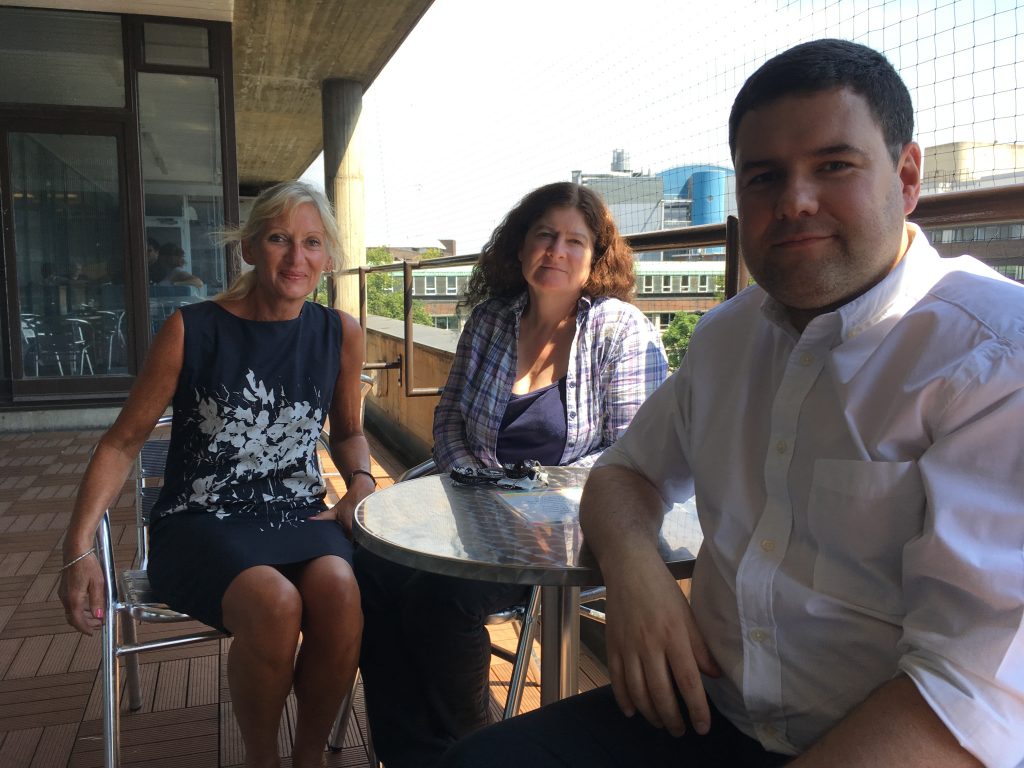Dr Fernando Russo Abegao, Teaching Fellow, Dr Sue Haile, Senior Lecturer and Sharon Joyce, Lecturer
School of Engineering
Science, Agriculture and Engineering
What did you do?
Implementation of online formative tests concerning sustainability to scaffold students learning prior to summative assessment.
Who is involved?
Fernando Russo Abegao, Sue Haile and Sharon Joyce.
Stage 1 students from Chemical Engineering degrees.
Stage 3 students from Singapore Chemical Engineering programme.
Students from MSc Programmes in Chemical Engineering.
Stage 4 students from MEng in Chemical Engineering.

Dr Fernando Russo Abegao, Dr Sue Haile and Sharon Joyce
How do you do it?
Sustainability is taught as an embedded topic along larger engineering practice modules. In the first year students are assessed with a design project case study at the end of the semester, in which they have to carry out a sustainability analysis of their designs.
Prior to that, online tests are released as formative tests. The tests are released half way through the lecture period before Easter, and cover a wide range of topics taught, focusing on practising understanding of key concepts, or simple application examples. Students are given until Easter to complete the tests. The validated learning is then applied after Easter to develop their sustainability analysis for the summative case study.
The module for the Singapore students was delivered remotely, 2 quizzes of round 10 questions each were used. They were released at appropriate times in the lecture plan and the students had 7 days to complete each quiz. The questions were of varying formats: multiple choice, ranking and matching statements. Students could have multiple attempts, within the timeframe, and all wrong answers had feedback.
For the MEng and MSc students, the test consisted of over 60 randomised online questions using a range of formats, (missing words, yes/no, ranking, matching etc.). It is designed to be attempted multiple times (with questions changing) until the students gains a pass mark of over 70%. When a question is completed there will be a pop up of ‘further information’ together with links to additional references. Questions can be grouped into topic areas to ensure the randomisation process does cover all major issues.
Why do you do it?
Design and analysis required a high level of cognitive skills, and particularly for stage 1 students, this needs to be scaffold by prior understanding of key concepts at a more fundamental level. In order to provide an opportunity for practice of concepts and break the learning process in smaller steps, before attempting a more comprehensive analysis, online Blackboard tests were introduced in stage 1.
With the Singapore students, we do not know their level of prior understanding, so the module must cover the key concepts and then go deeper. As it was a module delivered at a distance over Blackboard there was some evidence that in a previous year some students did not engage with the material in a timely manner over the semester and relied on their group mates for the coursework thus leaving themselves in a difficult situation come exam time.
The quizzes covered the delivered material up to their release and ensured that we could check all students had covered the topic material to a satisfactory level. For MSc and MEng students, the class has some students with a science background, and others with an engineering background. Mixing groups for case studies contributes a great deal in terms of complementary skills and background knowledge. However the module does need to assume certain levels of sustainability literacy and we have the challenge of trying to ensure students from different backgrounds have enough depth of knowledge of sustainability issues to enable them to work in groups on a summative Sustainability Optimisation (SusOp) case study. The quiz assists in both assessing students prior learning and also bringing students up to a higher level of awareness.
Does it work?
In stage 1, after the introduction of the online tests, and particularly this year that we have set a deadline for completion, it seems that most students have opted for taking the online tests, and the students have shown a better understanding of the sustainability concepts and have attempted a deeper analysis of their designs. It also seemed to have reduced the number of groups missing key areas in the analysis.
Validating students understanding of sustainability using online tests prior to summative application seems to be a good strategy. Most students in Singapore took the quizzes with little prompting but it did allow us to target the few stragglers and ensure they took the test (and hopefully covered the material).
Comparing the two years that this module was delivered online: this year had a higher average exam mark and higher feedback scores, but more importantly the lecturer was less worried about non-engagement. The MEng test was used this year as a trial on a voluntary basis and received very positive feedback from the students.
Contact details
Dr Fernando Russo Abego, School of Engineering
